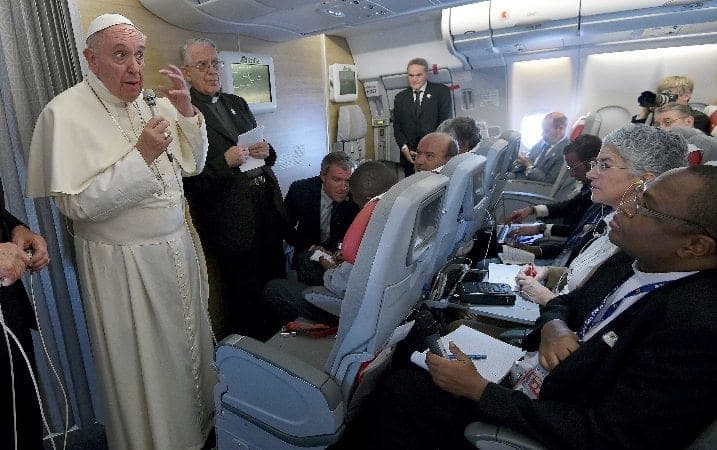ABOARD THE PAPAL PLANE — On the heels of a six-day trip to Africa in which he largely avoided debates over condoms and AIDS, Pope Francis on Monday described condoms as a “Band-Aid” solution to what he sees as the continent’s larger and more urgent humanitarian challenges.
The pontiff said questions about condom use are “too small” in the context of hunger, a lack of access to drinkable water, slave labor, environmental degradation, and war.
“When we no longer have these problems,” the pontiff said, then the conversation can turn to condoms. In the meantime, he said, “I don’t like doing casuistry,” meaning complicated moral reflections, “when people are dying for a lack of water and hunger.”
The pontiff said he felt “pain” in his encounters with the continent’s poor over the past week, including a visit to a Kenyan slum and a pediatric hospital in the Central African Republic, where a female doctor told him children routinely die of both malaria and malnutrition.
“If humanity doesn’t change course, misery, tragedies, [and] wars will continue, children will keep dying from hunger and injustice,” he said, pointedly asking what the small percentage of elites “that has in its hands 80 percent of the world’s wealth” thinks about the situation.
“This isn’t Communism,” the pope insisted. “It’s the truth.”
Francis made the comments in an airborne news conference while returning from Bangui, the capital of the Central African Republic, at the close of a Nov. 25-30 visit to Kenya, Uganda, and CAR.
Noting that in Uganda alone last year there were 135,000 new cases of HIV infection, a journalist asked the pope if the Catholic Church might change its teaching on the morality of condom use.
In response, Francis said the Church may seem to face what he called a “perplexity: the fifth or the sixth commandment? Life, or the openness to life of the sexual act?”
In reality, he suggested, that’s a false dilemma.
“It reminds me of when Jesus was asked: ‘Tell me Master, is it licit to heal on Saturday?’” Francis said. “It’s mandatory to heal,” he said, citing contemporary African examples of a need for healing in “malnutrition, human exploitation, slave labor, the lack of access to drinkable water.”
“When everyone is healed, when we no longer have these tragic things men cause – either for social injustice, or to make more money, think about gun trafficking … When we no longer have these problems, I believe we’ll be able to ask if it’s licit to heal on a Saturday.”
Visibly upset, he told the journalist who asked about condoms that the question is “partial,” focused on a yes or no to “a Band-Aid” and disregarding the bigger picture.
During the hour-long news conference, Francis touched on several other issues, including:
- Corruption within the Vatican, and the role of his predecessor Pope Benedict XVI in pushing the clean-up process
- A trial against three former Vatican employees and two journalists for leaking secret Vatican documents
- Religious fundamentalism and war
- A summit on climate change that began on Monday in Paris
Asked about the Vatican’s position on the conflict between Russia and Turkey after the downing of a Russian plane, Francis said, “I don’t know about the Vatican’s position, but I can tell you what I think: Wars are a sin.”
“[Wars] go against humanity, they destroy humanity,” he said.
The pontiff wondered aloud how terrorist movements are able to acquire the weapons with which they launch their attacks.
“They don’t produce guns,” he said. “Who gives them the weapons?”
Regarding the pending “Vatileaks” trial, the pope said it’s up to the judges to reveal the truth of what happened. Francis added that to him, the information revealed wasn’t a surprise, since it reflects what’s already been reported to him about efforts to fight corruption within the Vatican.
At the moment, Spanish Monsignor Lucio Angel Vallejo Balda, Italian public relations expert Francesca Chaoqui, and Italian layman Nicola Maio (Vallejo’s assistant), along with two Italian journalists, are facing criminal charges related to the leaks of confidential documents.
In his remarks, Francis conceded that in retrospect, naming Vallejo and Chaouqui to a papal commission to study financial reform was “a mistake.”
On Monday, a Vatican tribunal postponed the opening hearings in that trial until Dec. 7 to allow the defense more time to prepare.
Francis also took the opportunity to underline that he didn’t begin the Vatican’s clean-up, but his predecessor, Benedict XVI. As Francis put it, then-Cardinal Joseph Ratzinger was elected as the successor of Pope John Paul II because of his freedom to denounce corruption at the Church’s highest levels.
“He was the first one to speak against corruption,” Francis said.
On the issue of religious fundamentalism, Francis acknowledged that it’s found in all traditions, including Catholicism.
“Religious fundamentalism isn’t religious because it lacks God,” he said.
On climate change, he reiterated his appeal for world leaders currently meeting in Paris to try to adopt strong measures against global warming.
“It’s now or never,” Francis said.
“I’m convinced that most of those participating in the COP21 have a conscience and want to do something,” the pope said.
Before wrapping up, Francis was asked to share some “positive impressions” about Africa as a whole, a continent he had never before visited.
“Africa is a victim,” he replied. “It’s always been exploited by other powers. Slaves were sold to America, and there are countries that only want to exploit the great wealth Africa has.”
Francis defined Africa as a “martyr of exploitation,” adding that all those who say that Africa is the origin of “calamities and wars,” don’t understand the damage this exploitation does.
“This is why I love Africa: because it was a victim of other powers,” he said.














